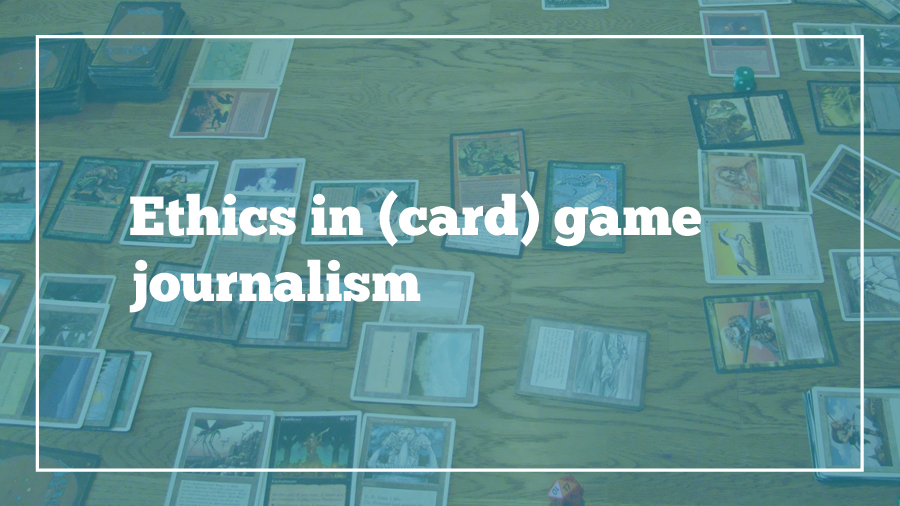
This week, something really cool happened to me—something that might make you lose your respect for me as a journalist.
On Monday, a representative from Wizards of the Coast dropped a note in my inbox asking me if I would be able to cover the Magic: The Gathering events at PAX Prime this year. I’ve covered M:TG events plenty in the past, for Forbes, the Daily Dot, and even Otaku Journalist. This time, I obviously had to decline. Since I splurged on a two-week trip to Japan in March, I knew I wouldn’t be able to afford to travel again until next year.
That’s when the rep shot back—what if we paid for your flight and hotel? I figured I had nothing to lose, and asked if they would also cover my husband, who has always wanted to go to PAX. It was a longshot, but the rep replied that’d be fine. I was over the moon!
You see, it wouldn’t be the first time I’ve gotten compensated in return for my reporting. Hasbro regularly sends me boxes of My Little Pony toys to review. Before I left the last M:TG event I covered, I received a swag bag put aside for me, just like every other reporter who showed up. Just about every card game I’ve reviewed for my Forbes blog has been gifted to me—as I disclose clearly in my reviews. Why would disclosing a plane ticket or a hotel stay be any different?
Well, it turns out it’s a lot different. My elation didn’t last long before my editor let me know there was no way I could accept this. For one thing, she pointed out, there’s a major price difference between a flight and a toy. For another, it’s against the rules to use the Forbes brand for personal gain. I could try to argue that they asked me to come because I’m a good reporter, but it’s pretty obvious they asked me because of my Forbes affiliation. While I’d be totally in the clear to write this up on my personal blog, Otaku Journalist only gets 30,000 hits a month.
For some of you reading this, everything up to this point confirms the worst that you believed about journalists. I’m willing to accept perks in exchange for reporting coverage.
I know the concern here is bias. A few years ago, when I was a Bitcoin reporter for ReadWrite, I bought $20 worth of Bitcoin in order to write about the experience. Shortly after that, the Bitcoin boom happened and I found that my $20 had become $150 overnight. My then-editor told me keeping it would bias my reporting, so I donated it to the Red Cross. (Hopefully, the Red Cross figured out how to extract it before Bitcoin’s worth plummeted again.)
Still, I’m not pigheaded enough not to know that I’m already biased. I have likes and dislikes that sway me incredibly—which is why I have given very bad reviews to things gifted to me, including a board game Wizards of the Coast sent me. And they were thrilled with that coverage! They’re not paying me for good reviews, just reviews in general.
And over time, I admit I’ve lost some of this rigidity. Last year when Hasbro sent me a shipment of My Little Pony toys, I donated them all to charity. Then, they sent me their Comic-Con 2015 exclusive. I sold it on eBay for $80 and went out to dinner. (Mind you, I didn’t review or even request these—they were just shipped to my house.)
How I justify it is this: I don’t feel like a bad person for taking what I can get. I get paid by the half penny for my Forbes coverage. As a human being who sells my body and time in order to feed myself (because that’s what hourly work is), I don’t feel like part of the media elite. I write about stuff I like, and sometimes companies take notice.
If anything, I hope this post sheds some light on the complex considerations that come up when journalists have to decide what they can and can’t accept for coverage.
Photo by Jesper Währner
Discover more from Otaku Journalist
Subscribe to get the latest posts sent to your email.




9 Comments.
This is an interesting post given the recent FCC disclosure scandal involving reviews of EA’s Shadow of Mordor game from a couple of years. I remember reading an old post about journalists having to draw a fine line between their bias and their responsibility to be objective.
I thought about being a hardcore journalist from reading so much game magazines in the past, but now I’m not so sure. :P
@MangaTherapy:disqus I can’t find a link, but I recall a movie studio flying out a bunch of film critics to Dubai to watch the film’s premiere. I was really surprised to see that all the critics’ reviews weren’t “A+++ BEST MOVIE EVAR.” People know what they like, I guess!
This is it. It’s about “disclosure.” http://www.gamespot.com/articles/shadow-of-mordor-comes-under-deceptive-marketing-s/1100-6441688
I believe that was Sex and the City 2… Which should tell you all you need to know.
Generally merchandise sent as review materials is not an ethical problem, as it is views simply as a normal business practice. But the reporter is not supposed to profit from the materials. They can keep or use them, but donating them to charity is a generally accepted ethical way to clear them out.
Swag is a different and grayer area. Normal low value marketing fluff is a non issue for the most part. No one cares if you get a t shirt and stress ball. But publishers have gone overboard in recent years creating high value exclusive swag for media. That gets real questionable. Case in point an SDCC exclusive figure, which shows up on the books as a less than $20 swag/gift item so no disclosure needed, but can be flipped to $80 real value on e-bay because of its exclusivity. That dances dangerously close to ethical lines if you are a consumer reporter (which is what niche subject hobbiest reporters are.)
I’m not saying you are crossing any lines,just that you may want to think a bit harder and deeper about the idea of “taking what you can get”. As any sort of reporter the product you are selling is not words. It is trust. If you have reached the point where “taking what you can get” from the industry you are covering seems like a valid compensatory path, then you have likely devalued or undervalued your core product and are not being properly compensated for it up front.
Great comment! Lots to think about here. In the case of the product I sold for $80, I justified it to myself because I never asked for it, never reviewed it, and never intended to. It was just a thing that showed up at my house. It said it was worth $20, but when I googled it, I saw it was actually valuable! Now though, comments like yours are making me wonder if I did the right thing.
Here’s another thing I didn’t mention—sometimes companies send me stuff after the fact. Like, I buy a game and review it. The company gets wind of it. Then they send me freebies, like an expansion to the game or something. As a result, my review doesn’t have a disclosure on it, because I didn’t get anything for free… YET.
Things like an Expansion Pack for a product you had published a review for are a non issue. They are just more “review materials” The company is hoping you will review the expansion as well. Just treat them as such. Dispose of them as you would any review product. So long as they are not sending you an XBox with a thank you note you are generally ok. You don’t always have to ask for review product. They will often send it wherever they know they have eyes already looking at their stuff.
So you’re telling me you’ve reviewed MLP toys?
@AsteriskCGY:disqus I actually have not. I’ve covered the brony phenomenon extensively, and Hasbro got my address. I sometimes write about their toys, but I’ve never actually reviewed one. Here’s an example—http://www.forbes.com/pictures/gkmj45mlf/my-little-pony-pinkie/#3979f0f01a97
I have to say, I’m both jealous and impressed. Many sites have fought tooth and nail against doing what you/Forbes did. To the point where they’ve decided to attack their audience, and some have gone bankrupt as a result. All cause they didn’t want to admit wrongdoing. So, thank you for your integrity.